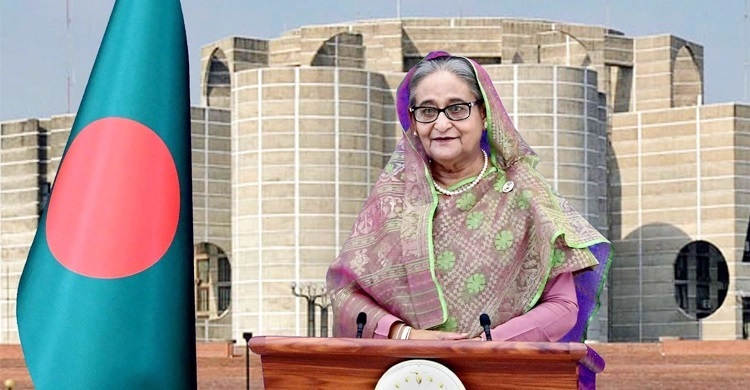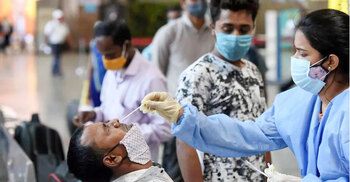PM for global institutions’ primacy to meet vaccine demand

Describing Covid-19 vaccine as global goods, Prime Minister Sheikh Hasina today said Bangladesh believes in primacy of United Nations and other international institutions to meet everyone’s demand for vaccines and medical requirements on the basis of equity and justice, reports BSS.
“Bangladesh believes in the primacy of the global institutions. All nations need to work together to make the UN and other international organisations effective so that everyone’s requirement of vaccines and medical requirement are met,” she said.
In a recorded speech aired in the plenary of a conference of the Boao Forum for Asia (BFA), she also said that the WHO, GAVI and other relevant organisations must uphold the rights of Member States and ensure equity and justice.
In this connection, she said, “We strongly believe that COVID-19 vaccines should be declared as global public goods. Countries producing the vaccines should help others produce the vaccines with a view to attaining universal vaccine coverage.”
The theme of the four-day annual BFA conference is “A World in Change: Join Hands to Strengthen Global Governance and Advance Belt and Road Initiative (BRI) Cooperation.”
The conference started in Boao, a coastal resort in South China’s Hainan Province on Sunday and continues till Wednesday this week.
At these critical times, Sheikh Hasina said that the financial and technical supports to developing countries have also become more important.
She added that developing countries need more access to the funds of the International Financial Institutions and the Multinational Development Banks.
Mentioning that the COVID-19 pandemic has brought us at a crossroad of human history confronting possibly the gravest global challenge of our times, Sheikh Hasina said that the socio-economic impacts of the pandemic are massive and are still unfolding.
She opined: “It is, therefore, extremely important to strengthen the global and regional partnerships through coordinated efforts to address these challenges.”
To this end, she said that Bangladesh has been trying to mitigate the adverse impacts of the pandemic through balanced measures between life and livelihood.
“We have so far announced various stimulus packages worth 14.6 billion dollars, around 4.4 percent of our GDP, for social protection and boosting economy,” she continued.
The prime minister said the pandemic highlights the crucial role of global governance to ensure that no one is left behind even during a crisis.
She stated that Bangladesh is engaged in different regional connectivity initiatives through South Asian Association for Regional Cooperation (SAARC), Bay of Bengal Initiative for Multi-Sectoral Technical and Economic Cooperation (BIMSTEC), South Asia Subregional Economic Cooperation (SASEC), Bangladesh, Bhutan, India, Nepal (BBIN) and Bangladesh–China–India–Myanmar (BCIM) forum.
In this connection, she said that Bangladesh is uniquely placed to connect the regions of South Asia, Southeast Asia, East Asia and beyond through multi-modal linkages and believes that Belt and Road Initiative (BRI) could play an important role in this regard.
“This continent has the advantage of huge demographic dividend, vast markets and the technological edge. If we join hands, together we can grow faster. This will also help us achieve the SDGs that we all committed to fulfill,” she continued.
“We need to maximise the technological potentials of the 4IR by extending hands each other,” she went on saying.
Sheikh Hasina said that Bangladesh has created a remarkable structure for facing the future challenges through establishing high-tech parks, broadband and satellite connectivity.
The premier said, “Most importantly, we have been preparing our young people for innovation, not just for imitation.”
Hence, together we also have to tap each other’s advantages as well as overcome various challenges that come with it, including cyber-crimes, she opined.
“Timely measures can help us realise the possibilities of the Asian Century,” she stated.
She also mentioned that Bangladesh is one of the most climate vulnerable countries.
Despite our resource scarcity, she said, “We established a climate Change Trust Fund of about 450 million dollars from our own resources. We have been implementing various adaptation and mitigation programmes to offset the adverse impacts of climate change. ”
She also said that their Parliament in November 2019 adopted a motion declaring ‘Planetary Emergency’ to deal with climate change issues.
As part of celebrations of the birth centenary of our Father of the Nation Bangabandhu Sheikh Mujibur Rahman, she said, “We are planting 30 million trees across the country. We have also adopted the ‘Mujib Climate Prosperity Plan’ which would help mobilise resources for a better and secured future. ”
Bangladesh is the current President of the Climate Vulnerable Forum-CVF, she said, adding, “We are also hosting the South Asian Regional Office of Global Centre for Adaptation. The centre will work on disseminating local-based innovative adaptation strategies.”
The prime minister ended her speech recapping three points.
Firstly, she said, “We need strong partnership among us to address the challenges posed by the pandemic, and to make vaccines available to everyone by declaring it as global public goods.”
Secondly, she added “We need to work together for harnessing the power of technology. As we all realise the future will be driven by the 4IR, which come with opportunities and challenges.”
And third or finally, Sheikh Hasina said that seamless physical and digital connectivity will be the key to reap the benefits of the Asian Century.
Noting that under the current state of globalization, every country has to do its part for common good, she said the nations and economies will have to look out for each other, as no single country in this world can sustain on its own.
She concluded, “Let’s think together, work together and grow together.”






